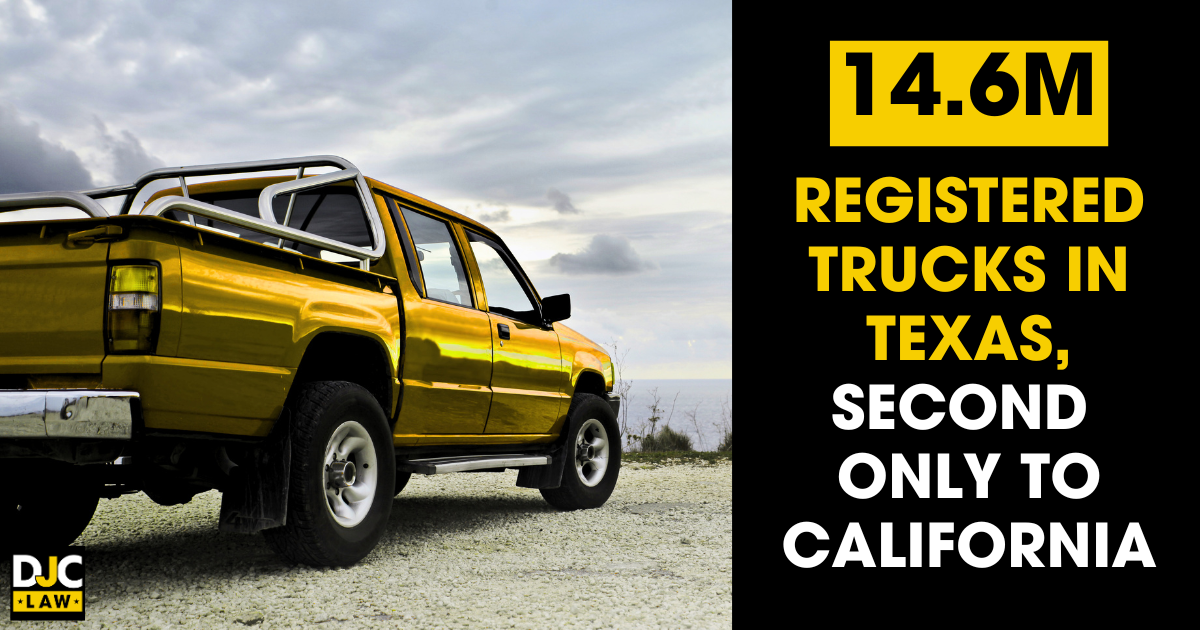
Many would say that trucks are a fixture of the Texas lifestyle. The Texas Department of Motor Vehicles reveals there are 14.6 million registered trucks in the Lone Star State, second only to California.
Riding in the bed of a truck is a chance to feel the wind in your hair and the sun on your face, but is it legal? A range of myths and misinterpretations exist regarding the legality of this practice, and this guide will discuss where the law stands. If you’re ever injured while riding in a truck bed, an experienced Austin car accident attorney can help protect your rights and pursue compensation.

Key Takeaways
- Riding in the bed of an open bed pickup truck is legal in Texas as long as passengers are aged 18 or over.
- It’s prohibited for minors to ride in the bed of a truck in Texas, except in exceptional circumstances, such as if you’re traveling due to an emergency.
- Significant safety risks exist from sitting in a truck bed because of the lack of protection and safety features. In all cases, your risk of injury and death spike if you choose not to ride in the cab.
- The most common injuries associated with collisions involving passengers sitting in a truck bed include spinal, neck, and head.
- Penalties for violating Texas laws on riding in the bed of a truck include a fine of up to $200, increased auto insurance premiums, and, in certain scenarios, criminal scenarios.
- The best way to deal with injuries sustained in a truck accident is to hire a lawyer who can assert your legal rights and pursue your right to compensation for your injuries and losses.
What is the Law Regarding Riding in the Bed of a Pickup Truck in Texas?

Many would say that riding in the bed of a moving pickup truck is dangerous, especially with the IIHS reporting 42,514 motor vehicle crash deaths every year. However, it’s perfectly legal for all adults 18 years and above to ride in an open bed or trailer.
Instead, Texas law focuses on prohibiting children from riding in the beds of trucks. With the IIHS also reporting the deaths of 2,883 teenagers in crashes in 2022, the focus of Texas’ legislature is protecting children on the roads.
If you’re pulled over and there’s a minor in your truck bed, you could be fined $25 to $200 unless you meet one of the few exceptions.
Exceptions for Children and Special Circumstances
The Texas Transportation Code 545.414 classifies a minor riding in an open flatbed truck as a misdemeanor punishable by a fine. However, safety regulations make exceptions for farmworkers, emergencies, and if you’re riding along a beach.
Typically, all exceptions are based on where you happen to be riding. So, when can a minor ride in the bed of your vehicle?
- During a parade.
- During an emergency.
- For transporting farmworkers between fields, farm-to-market roads, ranch-to-market roads, and county roads outside municipalities.
- On beaches, both public and private.
- If it’s the only vehicle owned by members of your household in line with the Texas Family Code Section 71.005.
- During authorized hayrides.
Safety Risks Associated With Riding in Truck Beds
Riding in open truck beds is always a risky practice because passengers don’t have access to any safety features and have the bare minimum of protection. Sudden stops, sharp turns, or another vehicle crashing into the back of your vehicle put you at risk of spinal cord injuries, traumatic brain injuries, and neck injuries.
Even though adults can ride in the back of trucks, safety experts still caution against the practice because of the lack of restraints and safety restraints. Statistics derived from the National Highway Traffic Safety Administration (NHTSA) reveal that 81% of totally ejected occupants of vehicles don’t survive the ordeal.
In short, the chances of experiencing life-changing injuries are substantially higher, which is why taking a ride in a truck bed isn’t recommended.
Common Injuries Resulting from Truck Bed Rides
Truck bed rides represent an enormous risk for passengers of all ages because of the lack of protection and the immense risk of being ejected from the vehicle during crashes. Severe injuries due to impacts to the head, spine, and neck are among the most significant risks of riding unrestrained.
Here’s a breakdown of the most common injuries resulting from this practice:
- Spinal injuries
- Traumatic brain injuries
- Neck injuries
- Internal bleeding
- Broken bones
- Organ ruptures
- Amputations
- Lacerations
- Burns
- Psychological trauma
The Dangers of Unrestrained Riding
Unrestrained riding isn’t a safe practice under any circumstances. Getting into the bed of a pickup truck means you’re always taking a risk, with an increased risk of exposure, risk of ejection, and exposure to the elements.
These three risks pose a threat to your life, so it’s vital to process the risk before riding unrestrained:
- Increased Injury Risks – Even at low speeds, sudden braking or turning can throw occupants around and out of the truck. The risk of serious injury rises exponentially at higher speeds or in an accident.
- Exposure to the Elements – You’re perpetually exposed to the chaotic Texas weather each time you ride in this fashion. There’s no protection from the weather, whether rain, snow, or extreme heat.
- Ejection Risk – Unplanned maneuvers can fully eject you from the truck, regardless of how careful the driver is. The risk grows even further on high-speed roads like highways or curving roads.
Penalties for Violating Truck Bed Passenger Laws
Violating truck bed passenger laws can result in fines, increased auto insurance premiums, and even legal action if the offense is considered serious enough. For example, you may be charged under child endangerment laws if the risk is exceptionally high.
Fines and Legal Repercussions
Breaking the law on riding in truck beds is a misdemeanor that commands a fine of $25 to $200, depending on your previous record and the risk involved.
However, traffic officers can also escalate the violation under different laws. For example, you could be charged under the Texas Penal Code Section 22.05 for reckless endangerment. If the offense involves a minor, you may face child endangerment charges under Texas Penal Code 22.041.
In both cases, getting found guilty under these laws could result in jail time.
Impact on Driver’s License and Insurance
It’s possible that you could lose your driving license if the offense is serious enough. Admittedly, this is an extreme penalty that won’t apply to the vast majority of situations. Like other traffic violations, receiving a citation could cause your auto insurance premiums to rise. Of course, each situation is unique, so there’s no telling what the precise consequences could be for you.
Comparative Laws: Truck Bed Riding Regulations in Other States
Every state sets its own laws on whether passengers may ride in the beds of trucks, otherwise known as cargo areas. Texas allows any passenger aged 18 or older to do it, but the rules aren’t the same in every state.
In many cases, other states have no local laws explicitly prohibiting the practice, meaning that it’s not illegal by default. Likewise, each state may define its own penalties, with some states taking a stricter view than others.
Currently, 21 states don’t have state laws restricting people from riding in the beds of trucks, regardless of age.
How Texas Laws Differ from Neighboring States
Texas has four states bordering it, with each state opting to take a different approach to riding in the beds of trucks.
- Arkansas – Arkansas doesn’t allow anyone to ride in the beds of trucks, with the sole exception of employees in the course of their duties.
- Louisiana – Louisiana permits passengers aged 12 or older to ride in the backs of trucks if the vehicle is on a non-interstate highway. Children may also ride in the cargo area if an adult is present and it’s an emergency.
- New Mexico – New Mexico takes a similar approach to Texas on the issue, with no restrictions on anyone aged 18 or older while prohibiting minors from riding in truck beds.
- Oklahoma – Oklahoma has no law prohibiting anyone from sitting in the truck bed, regardless of age or where the truck happens to be driving.
What to Do If You Witness Unsafe Riding Practices
Unsafe riding practices are dangerous to everybody. If you witness someone breaking the law by allowing minors to sit in the bed of a truck while driving, reporting it could potentially save somebody’s life.
Generally, the best way to deal with the practice is to pull over and call 911 when it’s safe to do so. Tell the operators what you saw and read the license plate number back to them. You’re not required to give your name or do anything else.
Reporting Protocols and Legal Obligations
Call 911 if you witness unsafe riding practices. Note that you should pull over in a safe place first because using your cell phone while driving is illegal unless you’re personally in danger. Although it’s down to the officer’s discretion, a traffic officer may not consider this call to be an emergency, so you could land yourself with a fine.
Note that you’re under no legal obligation to intervene or even report another driver breaking traffic laws. Regardless, it’s still wise to notify your nearest law enforcement agency to protect someone who could be putting themselves and others in danger.
Alternative Safe Transportation Options
Riding in the bed of a pickup truck can be exciting, but that doesn’t make it safe. Try to find safer transportation options to limit how long you spend in the back of the truck.
The easiest way to manage the situation is to use the truck cab itself. Many modern trucks come with enlarged seating to accommodate a larger number of people. The cab is always safer since you benefit from the extra protection of an enclosed space and the presence of safety features, such as safety belts.
If it can’t be avoided, such as if you work on a farm with a large number of employees, consider aftermarket safety solutions. These safety options include harnesses and seating designed to be placed in the beds of trucks.
Note that these aftermarket options might be safer, but they’re still no substitute for the safety of sitting in the cab.
Common Misconceptions About Riding in Truck Beds
The most common misconception about riding in truck beds is that it’s safe if you’re only moving short distances or at low speeds. The fact is that even at the lowest speeds for the shortest distances, sitting in the truck bed is unsafe.
Truck beds aren’t designed to protect passengers, meaning you’re giving up every innovation in motor vehicle safety available. These vehicles were designed with beds for cargo, not for the transportation of people.
Seeking Legal Help After an Injury in a Truck Bed
Truck drivers are responsible for any passengers they carry, regardless of whether they’re in the bed or the cab. If you were injured while sitting in a truck bed, you’ve got the right to seek legal help and pursue compensation.
Legal help is available to pursue insurance claims and file personal injury lawsuits against at-fault drivers. With the NHTSA reporting that unrestrained passengers are 20 times likelier to be ejected than restrained passengers, the chances of this happening to you are higher than you think.
How an Injury Attorney Can Assist
Experienced truck accident attorneys can assist you in your pursuit of compensation in a variety of ways. Not only can they file legal paperwork and manage the entire legal process, but they can gather evidence and build your case, ensuring that you have the strongest case possible.
Some of the functions of personal injury lawyers include:
- Gathering evidence for your case.
- Negotiating with insurance adjusters.
- Proving that the other driver was to blame.
- Managing legal paperwork.
- Providing objective advice at every turn.
- Taking your case to court.
- Ensuring you receive the largest settlement possible.
Possible Compensation for Truck Bed Injury Victims
Truck bed injury accident victims are entitled to receive compensation for all damages. You’re entitled to claim economic damages, such as medical costs, and non-economic damages, such as pain and suffering.
The range of compensation you might be entitled to include:
- Medical bills
- Lost wages
- Property damage
- Pain and suffering
- Wrongful death
It’s your personal injury attorney’s job to calculate the damages you’ve suffered and demonstrate that it was the actions of the at-fault driver that resulted in your losses and their long-term impact.
Contact Legal Experts for Assistance With Truck Bed Riding Laws
Working with legal experts to fight your case is crucial for maximizing your compensation and proving fault. Under Texas’ shared fault laws, you face the risk of being assigned partial blame, but with an experienced legal professional by your side, you can build a case that comprehensively proves the other party was at fault.
And it’s something that genuinely pays off. According to Nolo, plaintiffs who enlisted a lawyer as part of their claim received up to four times more in compensation than those who didn’t.
Consultation Process for Victims
The process begins with a free consultation, where a lawyer will discuss your case and sort through the facts. They’ll analyze every angle to determine whether you’re entitled to compensation and how much you could be eligible to claim.
Importance of Understanding Your Rights
The average person rarely understands the extent of their legal rights to compensation. On the other hand, insurance adjusters are fully aware of the law and are backed by teams of attorneys dedicated to reducing payouts.
Bad-faith tactics aren’t uncommon, despite being against the law, but they’re deployed anyway because most people aren’t aware of their legal rights. One of the benefits of hiring a lawyer is that they’ll defend and assert your legal rights, thwarting the efforts of auto insurers to protect their bottom lines.
Legal Implications of Truck Bed Injuries in Accidents
The legal implications of truck bed injuries are often misunderstood. If you’re not breaking Texas law, injuries will be managed in the same way as any other type of accident. However, if you were violating the law, such as by carrying minors in the bed of your truck, you could see your compensation reduced heavily.
Liability in Truck Accidents Involving Passengers in the Truck Bed
Liability in truck accidents follows the same principles as any other motor vehicle collision if you’re carrying passengers legally. Insurers can’t use it to blame you because you were following the law.
However, if you’re violating the law, this will impact liability. For example, if you were illegally carrying a minor in the truck bed and a speeding driver under the influence of alcohol hits you, you’re still entitled to claim compensation. The difference is that your settlement will be reduced due to your contribution to the accident.
How Comparative Negligence Affects Compensation in Truck Injury Cases
Texas is an at-fault state, meaning that the at-fault party is liable to pay compensation. The Lone Star State uses a comparative negligence model, meaning that fault can be shared, which has a big impact on how much compensation you actually receive.
The 51% bar rule is part of the comparative negligence system in Texas that states you can’t receive compensation if you’re 51% or more responsible for an accident. So, even if you assume partial responsibility, it doesn’t mean you can’t receive compensation.
In practice, if you’re eligible to receive compensation, your final settlement will be reduced by your contribution to the accident. For example, if you’re 25% responsible, you’ll lose a quarter of any final settlement.
When to Contact a Truck Accident Lawyer for Legal Assistance
The best time to contact an experienced personal injury attorney is as early as possible. Memories fade, eyewitnesses disappear, and evidence becomes harder to extract with time. Waiting to hire a lawyer only damages your chances, especially since Texas has a short statute of limitations on personal injury lawsuits of just two years.
If you’ve been involved in a truck accident, DJC Law is by your side. With a 99% case success rate and more than $400 million in settlements won, we’re one of Austin’s premier personal injury law firms. To get your free consultation, contact us today.


